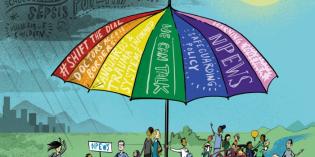
Last month’s presentation at the Senedd of Worried and Waiting, our report on paediatric waiting lists, generated our greatest response as a new team at RCPCH Wales from politicians and social media alike. This includes reaching over 8,300 people on one social media platform and featuring on four news sites, including BBC Radio Wales.
With nearly a third of Members of the Senedd (MS) that attended our event, six have posted messages of support on social media, two political parties have published press release on the report and the recommendations, a further two MS have done their own press release and multiple questions have been submitted to the Minister on child health for answering.
Our latest forays into data has generated further data, which itself is interesting, but is also useful to understanding where child health sits in the list of mounting priorities for the new Welsh Government.
The report has generated and reenergised discussions, including with the NHS Executive diabetes transitional care lead to address the large number of 2 year waits by patients aged 16-18y (more to come on this in April's blog) and the halving of paediatric wait lists in two health boards has led to paediatric leads seeking to share and learn from this.
What is good data?
The ability to take data—to be able to understand it, to process it, to extract value from it, to visualize it, to communicate it—that's going to be a hugely important skill in the next decades.
Data is not a simple numbers game, its all relative
At its simplest I hear raw data used to evidence a point. In a recent service development meeting, I heard “we have over 10,000 adult contacts a year to think about first” dwarfing my estimated, yet unverifiable, 800 contacts for young people 12-25y. There was no mention of staff numbers – an estimated 40 (adult service) to five (child health) - economies of scale, small service vulnerability to maternity or other leave and variation across health boards – just “that’s the way it is”.
In other respects, considering whether all data is equal - is a six month wait for a 4 year old, developing new skills and preparing for school, the same for 18 year old, working out their identity, world view and roles in life, or a 30 year old pregnant single mother of two, or a 70 year old on multiple waiting lists? I’ve seen how ill health affects the life trajectory of friends and peers at school and university to know where I'd reallocate resource.
- Case history
-
Data needs a good story to make a difference
I found this out during my time in Oxford when pitching to make sustainable a new service for persistent pain. We had taken plenty of good data to commissioners who expressed disenchantment with the existing eight adult services and our CEO had plenty of other services bidding for resource - it was a particular patient at a particular time that got things over the line.The patient was 15 years old with several years of marked hip pain, a normal MRI with no evidence of neoplasia, inflammation or tissue damage and a school attendance of 32%. She was desperate to get to university, to hang out with friends and to go on family walks. We had tried with multidisciplinary staffing within rheumatology to engage and provide an effective outpatient plan but such were her needs that she was added to a 13 month wait list for our “intense” pain management programme.
At the same time, I was working in a sports medicine clinic when we saw two students at Oxford University also with hip pain. Their MRIs were also free from neoplasia, inflammation and damage, but had a change in shape of the femoral head believed to be integral to the reason they developed pain in the latter half of a rugby match or cross country run. I saw them jointly with two surgeons and they were immediately listed for what was then experimental surgery to occur within the next few weeks.
The irony of the situation was not lost on my CEO and the paediatric persistent pain service has gone from strength to strength.
Data convenience
When faced with a difficult question, we often answer an easier one instead, usually without noticing the substitution
Taking care to ask the right question, not the easy one, was highlighted when assessing the utility of the Specialised Services Quality Dashboards (SSQD) for the Children’s Hospital Alliance. SSQDs, requested by NHSE, are data sets completed quarterly by specialist services to demonstrate longitudinal developments and compare against the national averages. From assessing eight years of data, it appeared that insufficient time had been spent by specialist communities identifying activity markers to encourage learning and change rather than rank performance. What is more, when data didn’t match expectations, the question was changed, not the delivery of care.
Nonetheless the willingness of services to complete quarterly data was shown and a survey of service leads by one of our fellows, and the manager of the Children's Hospital Alliance found that services felt that with the right local support and infrastructure for data collection and change management the effort would justify the return. Tellingly, only one set of services met annually to review, learn and adapt their data and this was reflected in whole population improvement.
And data quality, of course
Anyone creating a business case or attending those torture chambers called Performance Review Meetings (PRM – not PROM or PREM!) understands the murky world of NHS data quality.
My experience is that we all have a responsibility to maintain data quality so during my time at Oxford we kept our own and made sure data entries were meaningful to staff and routine decision making. Our databases started as simple spreadsheets to monitor referrals or blood tests and hold live data on parent names, preferences and contact details. The databases subsequently developed into a system that engaged in data protection, monitored clinic-based decisions, tracked change and enhanced nursing autonomy and family self-management. They were also adapted to national audits and dashboards and provided verifiable data for business cases - showing a 30% deficiency in hospital recorded activity, in both Oxford and London, that we turned to our population’s advantage.
What can we do in Wales?
This is just a snapshot of my experience with data, shared with the opportunities in Wales in mind to better embrace data.
Data to Knowledge (D2K) and the National Data Resource will underpin the Child Health Clinical Strategic Network and help deliver A Healthier Wales. These platforms are to provide All-Wales health and social care capabilities that will support our engagement with data literacy, provide an agile architecture to meet our and our patient’s needs and provide timely and responsive data access.
And if that doesn’t work we still have Prof Sinead Brophy and the teams at the fantastic SAIL databank – unique bodies of knowledge and data!










